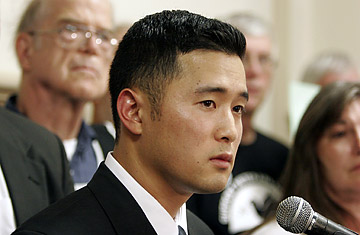
First Lieutenant Ehren K. Watada of the U.S. Army addresses the media on June 7, 2006 in Tacoma, Washington. Watada is the first commissioned officer to publicly refuse deployment in Iraq.
Watada, 28, refused to deploy to Iraq last June, calling the war there "manifestly illegal," and he had planned on using his court-martial proceedings to put the war itself on trial. He wanted to prove that the war was launched in violation of U.S. and international laws, and thus that he had a duty to his Army oath, and to his own conscience, to refuse the "illegal order" to serve in Iraq. In proving this, Watada hoped, he would inspire other soldiers to reconsider their own Iraq service.
But a series of pre-court-martial hearings and rulings have limited the scope of Watada's available arguments to the point that he and his lawyer now concede they have no ability to stick to their original strategy of putting the war on trial, and little hope of keeping Watada from a prison sentence. "Unfortunately, in the military system, when it comes down to war, the policies of war are dictated by the Administration," Watada said in an interview with TIME. His lawyer, Eric Seitz, is less circumspect. "Military courts don't constitute a justice system," Seitz says. "They constitute a disciplinary system. The Army isn't happy with what Lieut. Watada did and doesn't like what he said, so they're going to discipline him. The question is to what extent."
In January, a military judge ruled that Watada could not present arguments about the war's legality, saying such arguments involve a political question that is beyond the purview of the military court. The judge also ruled that the First Amendment does not protect Watada from punishment for making antiwar statements that the military claims amount to misconduct. Watada now faces up to four years in prison (down from six years, after two of the six charges against him were dropped in January in pre-court-martial maneuvering). His court-martial is likely to be concluded by Wednesday, with a verdict by the end of the week.
If, as expected, the military court finds Watada guilty on all or some of the remaining charges, Seitz says he plans to push the case into civilian courts — after first exhausting his appeals, as required, through the military justice sytem. "I would rate our chances substantial in civilian court," Seitz says. He believes that even if a civilian court declines to allow Watada to put the legality of the war on trial, it is likely to be much more sympathetic to Watada's argument that the First Amendment protected him from being charged with misconduct for his anti-war speech, even while in the military.
More than 100 soldiers have been prosecuted through the military justice system for refusing service in Iraq, and an unknown number of other soldiers have simply deserted, fleeing to Canada and other places. But Watada is believed to be the only officer to have refused deployment. And he is certainly the only soldier to have gone to his punishment in such a public manner, speaking at anti-war gatherings, enlisting the services of a D.C.-based public relations agency, and speaking to his supporters by video via a web site (thankyoult.org). Watada has not become a grassroots catalyst of antiwar activism like Cindy Sheehan, who has written in support of him. Still, last month, after the military court refused to hear his arguments on the legality of the Iraq War, his civilian supporters held a "citizens hearing" near his base to air that part of the case.
"I want all soldiers, including officers, to evaluate the legality of this war and find out the truth," Watada told TIME. He admitted that he had not inspired a groundswell of imitators within the ranks of the military, but he said he continued to hope that his experience would inspire other soldiers to reevaluate their responsibilities. "To me, somewhere along the line people have to have principles that they stand for," he said. "I went into this believing that I was following what my conscience dictated. Nobody else has to deal with your conscience but you for the rest of your life. It all comes down to: What are people willing to sacrifice?"
The relative paucity of support for Watada may stem from the fact that Watada willingly enlisted in the Army after Sept. 11, 2001, and as recently as the summer of 2005 had been willing to go to Iraq. He changed his mind, he said, when he learned more about the war. When asked why he is now refusing a job he essentially signed up for, Watada reframes the question, arguing that the job of a soldier includes refusing orders when he believes they are illegal. "I signed up to defend our country. The war in Iraq is hurting our country. Those who swear an oath need to stand up."
